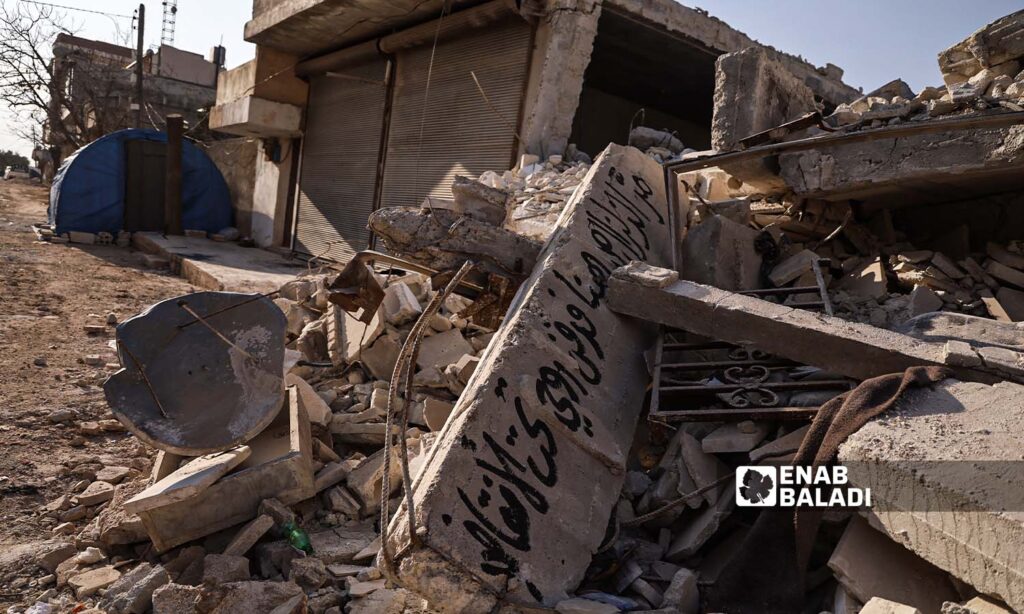Shakir’s nightmares of fear and sadness returned with the arrival of the first anniversary of the earthquake. On a night he compared to “judgment day,” his words faltered, and signs of sadness and defeat were evident on him after he lost several family members in the February 6, 2023 earthquake in Jindires, northwest of Aleppo.
Shakir Ajaj, a man in his thirties from the displaced people of southern Aleppo, lived in the city of Jindires, which became synonymous with the devastating earthquake that hit southern Turkey and four Syrian governorates, and has since been dubbed since “the disaster of the century” as the disaster-stricken Jindires.
“Like judgment day”
Ajaj told Enab Baladi that he will never forget that terrifying night, which has not left his mind over the past few days. The remnants of debris, the homes that were destroyed, pictures of friends and relatives who were victims, and the sounds of frightened children always remind him of the tragedy.
He added that he was at his independent house on the outskirts of western Jindires when the earthquake struck. He rushed out like a madman to check on his brother’s family, who lived on the fourth floor in downtown Jindires, and there he saw “the great catastrophe, as if it were a horror from the horrors of judgment day.”
Upon arrival, Ajaj found the building where his brother lived destroyed. It housed 36 people; only ten survived, and his brother’s family perished leaving his brother alive but unable to do anything. He watched his daughter die under the rubble, unable to save her.
Ajaj sold his house and now lives with surviving relatives in the al-Jabal camp, which they established after most of their homes in Jindires were demolished, living on scarce humanitarian aid, he says.
A man removing debris from a house in Jindires, northwest Syria – February 6, 2024 (Enab Baladi/Dayan Junpaz)
Jindires has not recovered
Zakaa Daher’s situation, a resident of Jindires city, is similar to that of Shakir Ajaj, as she lost three family members and dozens of friends, neighbors, and acquaintances.
Daher told Enab Baladi that the effects of the earthquake are still present in memory and reality. Efforts to repair some partially damaged homes and shops have not succeeded in removing the extent of the significant destruction.
Regarding the aid situation, Daher said it is very bad, noting that many whose homes were destroyed still live in camps established after the earthquake. She added that some humanitarian organizations have started offering grants and loans as aids to the affected.
Daher ended her talk by saying that the city of Jindires has not yet recovered from the earthquake’s damages, and there are many orphans and widows in the city. The spread of poverty and need has increased due to the damage to the business interests of many.
According to Jindires Media Council, the city’s entire appearance has changed after the earthquake, resulting in 1,354 deaths, the complete demolition of 489 buildings, partial damage to 2,529 buildings, and the destruction and damage of 24 schools and nine mosques.
Jindires witnessed dozens of unidentified bodies due to the earthquake, which were initially transferred to mortuary refrigerators, and after the refrigerators filled up, the bodies were moved to the vicinity of the Afrin Military Hospital, where dozens of bodies accumulated before being buried in the cemetery.
Bodies of victims in Jindires city as a result of the earthquake in northwestern Syria – February 7, 2023 (Enab Baladi/Dayan Junpaz)
Persistent needs
Hussein al-Hussein, a media activist residing in Jindires city, described the current situation of the city as awakening from the earthquake tragedy, with residents returning to their normal lives.
He told Enab Baladi that the pain exists and signs of sadness are apparent, but life continues. He mentioned that the educational situation in the city is not good. Despite the opening of a new school planned before the earthquake, one of the city’s largest schools, Khaled Ibn al-Walid School, accommodating 3,000 students, remains closed due to damages.
He said that most students who were studying there have now moved to schools that were opened in the nearby camps, pointing out that more than four organizations are working on repairs, but the need is greater, and there is heavy pressure with much slow work, as people wait for their turn for their house to be rehabilitated.
There is a focus in Jindires on paving the roads and completely removing the debris from the city. However, anyone familiar with the city feels a significant void, even though markets have returned to their normal activity, as well as agriculture. Meanwhile, the industrial movement in the area is considered weak.
The earthquake that struck southern Turkey and four Syrian provinces on February 6, 2023, resulted in more than 4,500 deaths and over 10,400 injuries in northwest Syria and displaced more than 57,000 families after affecting at least 148 cities and towns, destroying more than 1,869 buildings completely, and causing partial damage to more than 8,731 buildings.
In areas under the control of the Syrian regime, the earthquake caused the deaths of 1,414 people in Hama, Aleppo, and Latakia provinces. In Turkey, more than 56,000 people died, about 100,000 were injured, and millions were left homeless as a result of the earthquake.

